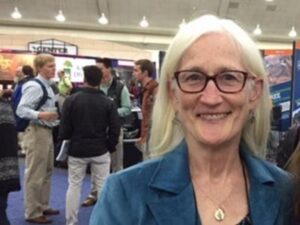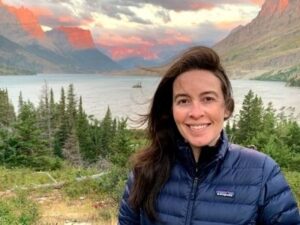 The COE shares faculty from across departments and programs at Wesleyan, including government, history, art, dance, computer science, English, philosophy, environmental science, biology, African American studies, physics, classical studies, chemistry, Science in Society, theater, religion, economics, archaeology, and more. Kim Diver is an associate professor of the practice in earth and environmental sciences here at Wesleyan and the founder and director of WesGIS. Her research focuses on island biogeography.
The COE shares faculty from across departments and programs at Wesleyan, including government, history, art, dance, computer science, English, philosophy, environmental science, biology, African American studies, physics, classical studies, chemistry, Science in Society, theater, religion, economics, archaeology, and more. Kim Diver is an associate professor of the practice in earth and environmental sciences here at Wesleyan and the founder and director of WesGIS. Her research focuses on island biogeography.
faculty
mountaineer byers joins coe as visiting bailey prof

Alton C. Byers, Ph.D. is a mountain geographer, conservationist, and mountaineer specializing in applied research, high-altitude ecosystems, climate change, glacier hazards, and integrated conservation and development programs. He is a senior research affiliate at the Institute of Arctic and Alpine Research (INSTAAR) at the University of Colorado at Boulder and the 2021-22 Menakka and Essel Bailey ’66 Distinguished Visiting Scholar in the College of the Environment.
zooarchaeologist brunson joins coe faculty
 The COE shares faculty from across departments and programs at Wesleyan, including government, history, art, dance, computer science, English, philosophy, environmental science, biology, African American studies, physics, classical studies, chemistry, Science in Society, theater, religion, economics, archaeology, and more. Katherine Brunson is a zooarchaeologist and assistant professor of archaeology at Wesleyan who studies the origins of China’s domesticated animals and the environmental impacts of animal domestication in China. She is currently investigating the genetic relationships between domestic cattle and the extinct East Asian wild aurochs. She also codirects the online Oracle Bones in East Asia project on Open Context.
The COE shares faculty from across departments and programs at Wesleyan, including government, history, art, dance, computer science, English, philosophy, environmental science, biology, African American studies, physics, classical studies, chemistry, Science in Society, theater, religion, economics, archaeology, and more. Katherine Brunson is a zooarchaeologist and assistant professor of archaeology at Wesleyan who studies the origins of China’s domesticated animals and the environmental impacts of animal domestication in China. She is currently investigating the genetic relationships between domestic cattle and the extinct East Asian wild aurochs. She also codirects the online Oracle Bones in East Asia project on Open Context.
raynor seeks to illuminate illegal and small-scale fishing
Jennifer Raynor is assistant professor of economics at Wesleyan. Her research focuses on natural resource management, with an emphasis on measuring the unintended consequences of rules and regulations. In fall 2021, she is teaching ECON210/Climate Change Econ and Policy. She joined the faculty of the COE in spring 2021.
o’connell explores cryosphere growth and demise

Suzanne O’Connell is the Harold T. Stearns Professor of Earth Science at Wesleyan. She studies Antarctic paleoclimate using marine sediment cores from IODP (International Ocean Discovery Program) in order to understand how Antarctica has changed in the past, information that will help researchers to understand and model future climate change. In fall 2021 she is teaching CIS221/Research Frontiers in Sciences and E&ES497/Senior Seminar.
economist raynor joins coe faculty
The COE shares faculty from across departments and programs at Wesleyan, including government, history, art, dance, computer science, English, philosophy, environmental science, biology, African American studies, physics, classical studies, chemistry, Science in Society, theater, religion, economics, archaeology, and more.
Jennifer Raynor is assistant professor of economics at Wesleyan. Her research focuses on natural resource management, with an emphasis on measuring the unintended consequences of rules and regulations. In fall 2021, she is teaching ECON210/Climate Change Econ and Policy. She joined the faculty of the COE in spring 2021.
visiting scholar byers champions wetland conservation

Elizabeth A. Byers is the 2021-22 visiting scholar in the College of the Environment. She is a senior wetland scientist with the West Virginia Department of Environmental Protection. During the last five years at WVDEP she has worked to create and implement an assessment tool that will become the law of the land in West Virginia in early 2022. Prior to joining DEP, she worked for 11 years as a Natural Heritage Ecologist and for 20 years as a hydrologist and conservationist in the Himalayas, East African rift, Andes, Rocky Mountains, and Appalachians. In 2020, Elizabeth published the first-ever field guide to the flora and ethnobotany of Mount Everest National Park.
